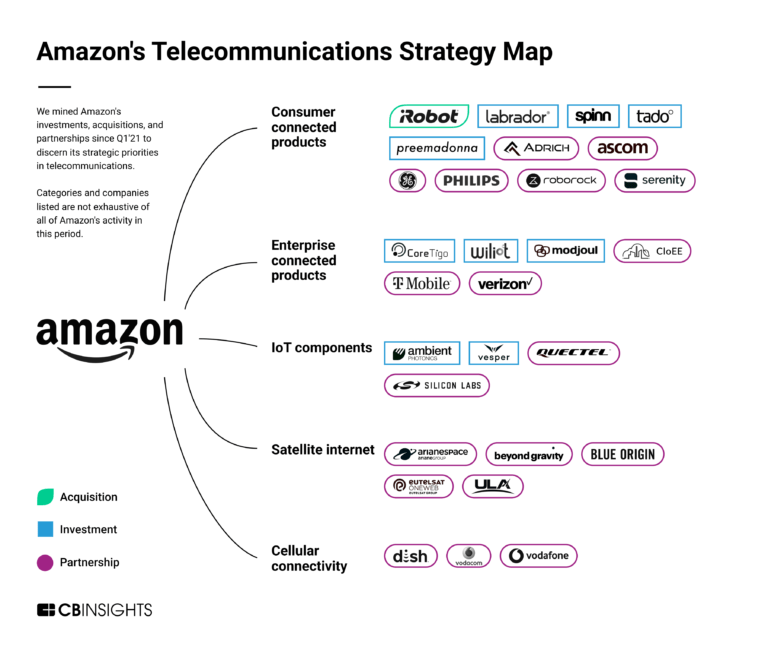
United Launch Alliance
Founded Year
2006Stage
Grant - II | AliveTotal Raised
$38.9MLast Raised
$25M | 2 yrs agoMosaic Score The Mosaic Score is an algorithm that measures the overall financial health and market potential of private companies.
+57 points in the past 30 days
About United Launch Alliance
United Launch Alliance is a company that provides launch services for space missions, operating in the aerospace sector. The company offers rocket launch services, including the transportation of satellites, crew, and cargo to various orbits, using its fleet of rockets such as Vulcan, Atlas V, and Delta IV. ULA serves the aerospace industry, including commercial, military, and government space missions. It was founded in 2006 and is based in Englewood, Colorado.
Loading...
ESPs containing United Launch Alliance
The ESP matrix leverages data and analyst insight to identify and rank leading companies in a given technology landscape.
The space launch systems (SLSs) market develops and operates vehicles capable of delivering payloads into space. These systems include both expendable launch vehicles (ELVs) and reusable launch vehicles (RLVs) designed to meet specific requirements of government agencies, commercial entities, and scientific research institutions. The market encompasses various solutions including small satellite l…
United Launch Alliance named as Outperformer among 15 other companies, including Northrop Grumman, SpaceX, and Boeing.
Loading...
Research containing United Launch Alliance
Get data-driven expert analysis from the CB Insights Intelligence Unit.
CB Insights Intelligence Analysts have mentioned United Launch Alliance in 2 CB Insights research briefs, most recently on Oct 25, 2023.
Expert Collections containing United Launch Alliance
Expert Collections are analyst-curated lists that highlight the companies you need to know in the most important technology spaces.
United Launch Alliance is included in 2 Expert Collections, including Aerospace & Space Tech.
Aerospace & Space Tech
3,857 items
These companies provide a variety of solutions, ranging from industrial drones to electrical vertical takeoff vehicles, space launch systems to satellites, and everything in between
Defense Tech
1,175 items
Defense tech is a broad field that encompasses everything from weapons systems and equipment to geospatial intelligence and robotics. Company categorization is not mutually exclusive.
United Launch Alliance Patents
United Launch Alliance has filed 36 patents.
The 3 most popular patent topics include:
- spacecraft propulsion
- industrial gases
- fluid dynamics

Application Date | Grant Date | Title | Related Topics | Status |
|---|---|---|---|---|
12/7/2022 | 4/8/2025 | Grant |
Application Date | 12/7/2022 |
|---|---|
Grant Date | 4/8/2025 |
Title | |
Related Topics | |
Status | Grant |
Latest United Launch Alliance News
Sep 8, 2025
Congress and Trump may compromise on the SLS rocket by axing its costly upper stage "At $4 billion a launch, you don’t have a Moon program." | The upper part of the Space Launch System rocket and the Orion spacecraft flown on the Artemis I mission is shown here. Credit: Trevor Mahlmann The upper part of the Space Launch System rocket and the Orion spacecraft flown on the Artemis I mission is shown here. Credit: Trevor Mahlmann Text settings Minimize to nav There are myriad questions about how NASA's budget process will play out in the coming weeks, with the start of the new fiscal year on October 1 looming. For example, the Trump administration may seek to shut off dozens of science missions that are either already in space or in development. Although Congress has signaled a desire to keep these missions active, absent a confirmed budget, the White House has made plans to turn off the lights. Some answers may be forthcoming this week, as the House Appropriations Committee will take up the Commerce, Justice, and Science budget bill on Wednesday morning. However great uncertainty remains about whether there will be a budget passed by October 1 (unlikely), a continuing resolution, or a government shutdown. Behind the scenes, discussions are also taking place about NASA's Artemis Program in general and the future of the Space Launch System rocket specifically. $4 billion a launch is too much From the beginning, the second Trump administration has sought to cancel the costly, expendable rocket. Some officials wanted to end the rocket immediately, but eventually the White House decided to push for cancellation after Artemis III. This seemed prudent because it allowed the United States the best possible chance to land humans back on the Moon before China got there, and then transition to a more affordable lunar program as quickly as possible. Congress, particularly US Sen. Ted. Cruz, R-Texas, was not amenable. And so, in supplemental funding as part of the "One Big Beautiful Bill," Cruz locked in billions of dollars to ensure that Artemis IV and Artemis V flew on the SLS rocket, with the promise of additional missions. Since the release of its budget proposal in May, which called for an end to the SLS rocket after Artemis III, the White House has largely been silent, offering no response to Congress. However that changed last week, when interim NASA Administrator Sean Duffy addressed the issue on a podcast hosted by one of the agency's public relations officials, Gary Jordan: Here is my one concern. If Artemis I, Artemis II, and Artemis III are all $4 billion a launch, $4 billion a launch. At $4 billion a launch, you don’t have a Moon program. It just, I don’t think that exists. We have to bring the price down. And so I have to think about and work with members of Congress. What does Artemis IV, V, and VI look like? But to spend that much money in thinking about what we have to do to have a sustained presence, I think becomes very, very challenging. And so what? What is the answer? I don’t know, but those are things that I think about, because you look at what the private sector has done for access to space. For the private sector, again, you can, you can have a satellite and get it into space for, you know, a million, little over a million dollars, like that was unheard of 20 years ago. What’s happening to drive the price down of these, of these vehicles. That’s what we have to think about, because the $4 billion figure just is too massive to think we can be sustainable at that number. In these comments Duffy clearly argues that the SLS rocket is unaffordable and that any lunar program built around it cannot be sustained for more than a few flags-and-footprints missions. Instead, he says, the agency should be taking advantage of commercial alternatives (which are being developed by SpaceX and Blue Origin). So is this an impasse? Possibly not, as sources say the White House and Congress may not be all that far apart on how to handle this. The solution involves canceling part of the SLS rocket now, but not all of it. Let’s make a deal The language in Cruz's supplement to the "One Big Beautiful Bill" says NASA must procure and operate the Space Launch System for Artemis IV and V missions but does not specify the configuration of the vehicle. NASA had been intending to upgrade the rocket with a new second stage, the Exploration Upper Stage, starting with Artemis IV. However this upgrade has already cost NASA billions of dollars and has necessitated construction of a launch tower that has vastly exceeded its original cost (now estimated at $2.7 billion) and is years behind schedule. For this reason the House Appropriations Bill calls for the space agency to "evaluate alternatives" to the Exploration Upper Stage. One of these, as Ars reported last year , is the Centaur V upper stage built by United Launch Alliance, which is already flight proven. Another option is a "short" version of the upper stage Blue Origin currently flies on its New Glenn rocket. Sources indicated that Blue has already begun work on a modified version of the stage that could fit within the shroud of the SLS rocket. This smaller version of the stage, like the Centaur V, would allow NASA to continue launching the SLS rocket using the existing launch tower in Florida. By canceling the Exploration Upper Stage and second launch tower, NASA could save more than $1 billion, annually, that could be applied to other aspects of the Artemis program to ensure its success both in the near and longer term. It would give the Trump administration the talking points it wants on making Artemis more affordable and allow Congress to continue flying its beloved SLS rocket for a few more missions. Finally, it would buy time to see whether SpaceX and Blue Origin can get their Starship and New Glenn rockets flying regularly and whether NASA can bring down the cost of a partly commercialized SLS rocket. At that point the future of NASA's deep space program, and the rockets it should use, will be clearer.
United Launch Alliance Frequently Asked Questions (FAQ)
When was United Launch Alliance founded?
United Launch Alliance was founded in 2006.
Where is United Launch Alliance's headquarters?
United Launch Alliance's headquarters is located at Galileo Operations Center, Englewood.
What is United Launch Alliance's latest funding round?
United Launch Alliance's latest funding round is Grant - II.
How much did United Launch Alliance raise?
United Launch Alliance raised a total of $38.9M.
Who are the investors of United Launch Alliance?
Investors of United Launch Alliance include NASA.
Who are United Launch Alliance's competitors?
Competitors of United Launch Alliance include Firefly Aerospace and 8 more.
Loading...
Compare United Launch Alliance to Competitors
Orbital ATK focuses on aerospace and defense and provides systems and services for space-related applications. The company offers a range of products, including space launch vehicles, satellite components, and missile defense systems. Orbital ATK serves various sectors, including government and commercial space and defense markets. Orbital ATK was formerly known as Orbital ATK. It was founded in 2015 and is based in Dulles, Virginia. Orbital ATK operates as a subsidiary of Northrop Grumman.

SpaceX specializes in the design, manufacture, and launch of rockets and spacecraft in the aerospace industry. Its offerings include launch services for payloads such as satellites and cargo, as well as the development of spacecraft for human spaceflight. The company serves sectors such as government space agencies and commercial satellite operators. It was founded in 2002 and is based in Hawthorne, California.

Exos Aerospace specializes in suborbital space access and operates within the aerospace industry. The company provides launch services using reusable rockets and offers options for orbital transfer and space transportation, utilizing Type 5 carbon composite tanks. It serves sectors that require space access for scientific, educational, and exploratory purposes. It was founded in 2014 and is based in Greenville, Texas.

Blue Origin is a company focused on space exploration and technology within the aerospace industry. The company develops reusable rocket engines, launch vehicles, in-space systems, and lunar landers. Blue Origin primarily serves the commercial spaceflight and space exploration sectors. It was founded in 2000 and is based in Kirkland, Washington.

Relativity Space operates a commercial launch company that focuses on the aerospace industry. The company specializes in providing launch services using reusable rockets and manages additive manufacturing to reduce vehicle complexity and production costs. Relativity Space primarily serves the space infrastructure sector with its launch capabilities. It was founded in 2015 and is based in Long Beach, California.

Interorbital Systems is involved in the development and manufacturing of orbital launch vehicles and satellites, operating within the aerospace industry. The company provides launch services, including suborbital, orbital, and interplanetary missions, as well as satellite kits available as CubeSats and TubeSats, applicable to private, commercial, governmental, academic, and military domains. It was founded in 1996 and is based in Mojave, California.
Loading...


